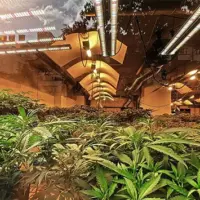
Beckham County, OK — Beckham County Sheriff Derek Manning says illegal marijuana grows in Oklahoma are on the decline, thanks in large part to increased administrative enforcement. But he warns that a new issue is taking root: abandoned grow sites left behind by owners who simply walk away, leaving behind trash, chemicals, and plastic debris to blow across neighboring farmland.
“We have a lot of marijuana growers in Oklahoma that are just not legal,” Manning said. “Some do it by the book and do it very well. But the number of illegal grows is less than half of what it was two or three years ago, and that number is still going down.”
According to Manning, the drop is largely due to administrative actions—licenses revoked, fake owners exposed, and missing paperwork flagged—rather than the traditional method of traffic stops leading to search warrants.
But that success has uncovered a new side effect: grow operators disappearing, leaving behind their greenhouses—often hoop houses made of plastic sheeting and metal poles—along with chemicals, fertilizer bags, and other waste.
“All of that plastic sheeting and trash ends up blowing into neighboring fields,” Manning said. “And around here, that means cattle pasture or farmland. It’s not something you can just leave. Farmers are calling, asking what they can do, and right now, there’s not much.”
The problem is widespread across the state, Manning added, and lawmakers are taking notice. The Oklahoma Bureau of Narcotics (OBN) and state legislators are preparing for an interim study to examine the scope and impact of these abandoned grow sites.
In most cases, the people responsible are out-of-state operators who cannot be located. Manning hopes the state will consider laws that allow for cleanup funding, property seizure, and resale at auction.
“If you walk away and leave a mess, the state should be able to take the land, clean it up, and sell it,” Manning said. “Because this isn’t something the average landowner can safely handle. Some of this stuff is toxic.”
Manning praised OBN for their work and emphasized that while the illegal grows are decreasing, the job is far from over.
“Hopefully in a year or two we’ll start seeing real solutions,” he said. “Until then, the mess is ours to deal with.”







